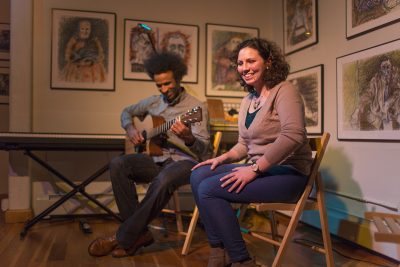
Sometimes, there is no combination of words to string together to describe certain feelings. Sometimes, words simply aren’t enough.
This is exactly the sentiment Emerging Boston Area Singer-Songwriters, known as EBASS, tackled on Thursday with their “Where Words Fail, Music Speaks” concert at Gallery 263, an intimate venue in Cambridge. Hailey Magee, EBASS’s founder and director, has worked hard to establish a strong community for over 700 Boston musicians.
“The community was started to bridge the gap between those emerging and established artists by offering them opportunities to connect with one another, promote their performances and also perform,” Magee said.
The show consisted of five curated performers and also offered an open mic portion where audience members could perform anything, from their own music to spoken word, or simply sit and tell their story. People shared stories of abuse, mental illnesses, oppression and social issues they’ve observed.
Whatever it was, each performer had one thing in common — they all came from a place of struggle and learned to use music as a way to release their emotions and connect with their audience in a way that would not have been possible for them otherwise.
Singer Katie Solomon, part of the musical duo Jack & Katie, shared how her struggle to find adequate words in her everyday life inspires the songs she performed at the show.
“I feel very inarticulate in my daily life just with English words,” Solomon said. “Often what inspires me is what I want to say to somebody or when I’m feeling like I can’t articulate in regular speech. I think in a way that doesn’t flow linearly. Being able to write something that feels like it’s actually expressing what’s happening internally, that’s powerful for me.”
This is the case for many singer-songwriters, which is why Magee said she felt strongly about designing a concert around the idea of using music to express emotions when normal speech could not.
Jack Lewis, the other half of Jack & Katie, agreed that this was a powerful sentiment. He explained how it’s possible for him and Solomon to collaborate on their music.
“Our common ground is sort of the feeling that in regular day life we can’t get out what we’re feeling,” Lewis said, “and we don’t have a good way of describing what we’re feeling, so we both kind of came together to write stuff that works for both of us.”
Another performer, Louis Apollon, used his set to spread awareness on the issue of homelessness in Boston. He learned a lot from meeting and talking to homeless people in the Boston area about the hardships they face every day, Apollon said. With one of the songs he performed at the show, he expressed how he wanted to call out everyone who consciously walks by homeless people without even batting an eyelash.
Most of these people just want to be a part of everyday conversations, and they really aren’t all that different from us, Apollon said. Through his music, he said he hopes to spread the message that “we are all human beings who deserve to be treated with respect.”
Though Apollon showed how important music can be to spread big-picture social messages, the show also emphasized how becoming lost in music can be imperative to personal catharsis and healing.
Singer-songwriter Hannah Christianson closed the concert with a powerful and vulnerable set that she said helped her get through a very intense time in her life while she was battling severe anxiety and depression. Despite her experiences in such a dark time, she used music to push herself forward.
“This particular event felt very special to me because it’s so close to why I do music,” Christianson said. “I’ve always been really interested in the healing aspect of music and for me, music has always been a tool to process the world around me; to reflect, to get through things, to feel, to discover something deeper that I didn’t know what was there.”









































































































